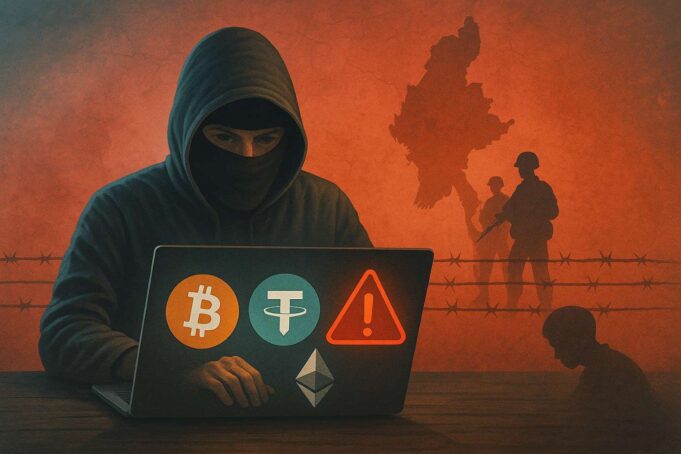A sprawling cyber scam industry, backed by militia power and fueled by cryptocurrency, has taken root in Burma’s lawless borderlands. The U.S. Treasury’s recent sanctions against the Karen National Army (KNA) and its warlord leader Colonel Saw Chit Thu reveal a sophisticated network exploiting blockchain infrastructure to conduct “pig butchering” scams that have siphoned billions from unsuspecting victims worldwide. This dark underworld of digital fraud exposes how cryptocurrencies, once heralded for decentralization and freedom, have become key tools in transnational organized crime.
Pig Butchering Scams and the Role of Crypto
At the heart of the KNA’s illicit operations are “pig butchering” scams. These highly organized schemes groom victims over time via messaging platforms and dupe them into investing in fraudulent crypto platforms. Once they built trust, they encourage targets to deposit increasing amounts of cryptocurrency into fake exchanges or wallets controlled by scammers. These scams have evolved to mirror legitimate trading platforms, making detection more difficult even for seasoned investors.
The use of blockchain-based assets makes cyber scam schemes like the ones in Burma particularly difficult to trace. Scammers often use crypto mixers, decentralized exchanges, and privacy coins to obfuscate the origins of funds. They launder the proceeds through multiple wallets before cashing out. Criminal actors are weaponizing the very features that make crypto attractive to privacy-conscious users. Anonymity, decentralization, and lack of oversight enable these scammers to operate at scale and with impunity.
Sanctioned Militia and Criminal Syndicates
On May 5, 2025, the U.S. Department of the Treasury sanctioned the KNA, Colonel Saw Chit Thu, and his two sons for their involvement in facilitating cyber fraud, illegal gambling, and human trafficking. According to the U.S. government, the KNA leases land and infrastructure to scam operators in territories like Shwe Kokko and Myawaddy. Both are known hubs for digital fraud and criminal activity. The militia also provides protection, utilities, and logistical support to scam compounds.
These operations are closely tied to Chinese and Southeast Asian organized crime syndicates. Many scam compounds are staffed by trafficked labor, individuals lured from countries such as China, Vietnam, and the Philippines. They are promised legitimate employment, only to be forced into executing scams under threat of violence.
A Digital Criminal Economy at Scale
The cyber scam economy in Burma is a lucrative enterprise. A report from The Market Periodical cited estimates of over $5.5 billion in global losses attributed to such frauds. Many are routed through crypto transactions. The infrastructure supporting these crimes includes professional-grade call centers, AI-assisted messaging scripts, fake crypto trading apps, and even fraudulent blockchain explorers.
The Karen National Army’s territory has functioned as a quasi-autonomous criminal haven. Despite their ostensible identity as an ethnic insurgency group, the KNA’s economic model increasingly resembles that of a mafia enterprise. It embraces digital tools to expand its influence across borders.
Global Scrutiny and Sanctions Response
The sanctions imposed by the U.S. are part of a broader international crackdown on cybercrime networks exploiting crypto technologies. These sanctions freeze any U.S.-linked assets and prohibit American individuals or entities from engaging in financial transactions with the designated parties.
However, enforcement faces considerable challenges. Burma’s political turmoil and fractured control over its border regions have created a regulatory void allowing such operations to flourish. Moreover, many of the platforms used in these scams are hosted across jurisdictions with weak enforcement mechanisms. Coordinated international action is essential but complex.
Conclusion: A Test for Blockchain Governance
The rise of crypto-enabled cybercrime in Burma highlights a pressing need for better oversight and cross-border cooperation in blockchain governance. As financial crimes grow more sophisticated, regulatory bodies and the crypto industry alike must contend with the darker consequences of decentralization.
For blockchain to remain viable and trusted, it must evolve with mechanisms to detect and prevent abuse, without compromising its foundational principles. The case of Burma’s scam compounds is a stark warning of what can happen when powerful digital tools fall into the wrong hands.
Readers’ frequently asked questions
How can I recognize a “pig butchering” scam if I come across one?
“Pig butchering” scams usually begin with friendly, seemingly accidental messages on WhatsApp, Telegram, or social media, often along the lines of, “Hi, is this Alex?” or “Sorry, I think I texted the wrong number.” What follows is a slow build of rapport. The scammer eventually pivots the conversation to cryptocurrency or investment, offering insider tips or access to an “exclusive” trading platform. A key red flag is that these platforms often don’t exist on public app stores or exchanges. They may require direct download or crypto wallet connections. Returns seem unrealistically high, withdrawals are delayed or blocked, and there’s a repeated push to deposit more. If someone you didn’t know a month ago is giving you investment advice and asking you to fund a crypto wallet or click on a link, it’s almost certainly a scam.
Why do they use crypto in these scams instead of regular money or bank transfers?
Cryptocurrencies are attractive to scammers because they allow transactions to move across borders almost instantly, often with minimal identity checks. Most blockchains are pseudonymous, ie. wallet addresses don’t require your real name. Moreover, certain tools, like mixers and decentralized exchanges, help launder funds without needing traditional bank infrastructure. Once money is transferred via crypto, especially into platforms the scammer controls, it becomes incredibly difficult to recover. Banks can reverse fraudulent wire transfers or freeze suspicious accounts, but crypto lacks centralized enforcement unless law enforcement gets involved early and knows exactly where to look. That’s why crypto is the go-to tool for cyber scam syndicates like the ones in Burma: fast, global, and hard to trace.
Can authorities actually recover stolen crypto from these scams, or is it gone forever?
It depends on how fast victims report it and whether law enforcement has visibility into the blockchain flows. In high-profile cases, agencies like the FBI or blockchain forensics firms such as Chainalysis or TRM Labs have helped track funds and freeze them if they hit centralized exchanges. But in many pig butchering scams, the crypto moves through decentralized tools or offshore exchanges that don’t comply with international regulations. In such cases, recovery becomes almost impossible. Prevention remains far more effective than recovery. That’s why education, vigilance, and the use of reputable, regulated platforms are so critical for new investors.
What Is In It For You? Action Items You Might Want to Consider
Vet every trading platform – twice!
Before you send funds to any new crypto trading app or platform, take the time to verify its legitimacy. Cross-check domain names, check whether it’s listed on trusted crypto data aggregators like CoinGecko or CoinMarketCap, and read independent reviews. If the platform is only accessible via a private link or mobile APK file, treat it as a red flag. When in doubt, don’t connect your wallet.
Stay alert to unsolicited investment offers
If someone you met on social media or a messaging app starts steering the conversation toward crypto trading or promises high returns, it’s time to walk away. These tactics are central to pig butchering scams. Your best defense is a strict policy: no financial dealings with strangers online, ever!
Use blockchain analytics tools to track activity
Leverage tools like Etherscan, BSCScan, or even more advanced options like Arkham or Breadcrumbs. Analyze wallet addresses and smart contracts before interacting. If a wallet or contract has no history, strange token movement, or ties to known scam addresses, steer clear. A few extra minutes of due diligence can save you thousands.











[…] >>> Read more: US Sanctions Burma Militias Over Cyber Scams […]
[…] >>> Read more: US Sanctions Burma Militias Over Cyber Scams […]